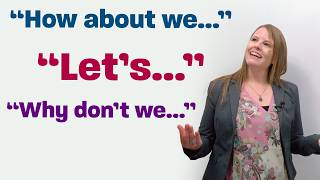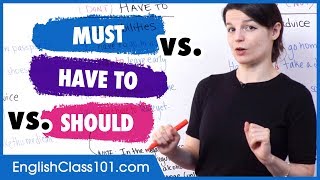
EASY ENGLISH CONVERSATION: “Let’s...”, “How about...”, “Why don’t we...?” สาธารณะ
ประเภท:
ลักษณะ:
Learn three super-easy and very common conversation expressions: “Let’s”, “how about”, and “why don’t we”. You can start using these in conversations today! These expressions are commonly used in social situations. We use them when we are making plans with people. In this lesson, I will give examples of each of the expressions and you will also learn the grammar behind them. After watching, you can take the quiz to practice what you’ve learned. How about it? https://www.engvid.com/easy-english-conversation-lets-how-about-why-dont-we/
In this lesson:
0:00 Introduction
0:31 "Lets"
2:42 "Lets not..."
4:00 "lets" or "lets"?
4:53 "How about we...?"
6:40 "How about": Grammar
8:34 "How about" in the negative
9:10 "Why dont we...?"
11:01 "Why dont we...": Grammar
TRANSCRIPT:
Hello.
My name is Emma, and today I am going to teach you three easy expressions we use in everyday
English.
Im going to teach you "lets", I will teach you "how about", and I will also teach you
"why dont we".
So these are important expressions.
Ill teach you the grammar as well as how we use them.
So lets get started.
The first one were going to look at is "lets".
We use "lets" when we are making a suggestion.
We are presenting a plan or idea to another person.
So my first example is "Lets go to the park."
What does this mean?
Well, "lets" means "let us", so it means "we".
"Let us go to the park."
"Lets go to the park."
And it just means my suggestion is we go to the park together.
Now its really important that you notice this little apostrophe here, because without
this apostrophe, "lets" has a different meaning.
Ill explain that in a moment.
My second example is "Lets have lunch at 1pm."
What does this mean?
Well, it means my suggestion or my idea is we should have lunch at 1pm together.
So lets talk about the grammar of "lets".
So when we use "lets", again, it means "let us", its followed by the base form of a verb.
So what does that mean?
Well, the verb does not have "ed", it does not have "ing", it does not have a conjugation;
its just the base form.
So lets look at some examples.
I could say "Lets watch a movie."
"Watch" is the base form of the verb "to watch".
I could say "Lets see a show."
"See" is the base form of the verb "to see".
"Lets do art."
"Do" is the base form of the verb "to do".
Or "Lets eat a piece of cake."
And so, again, these are all suggestions on what you want to do with another person together.
So can you make a negative sentence with "lets"?
You sure can.
If you add "not", you can make a negative sentence or a negative suggestion.
So for example, "Lets not", and then you have the base of the verb.
Imagine somebody says to you, "Hey, lets eat 30 hot dogs tonight."
I dont think thats a good idea, so you might say, "Hmm, lets not eat 30 hot dogs together."
Or maybe somebody says, "Hey, lets go camping tonight."
If you dont like camping, you might say, "Lets not go camping tonight.
Lets do something else instead."
Maybe somebody wants to pull an all-nighter, stay up all night studying English at the
library.
You might say, "Hmm, lets not study English all night at the library."
So these are some examples of how to use "not".
So, again, it follows "lets", and "lets" stands for "let us", so "Lets not do this."
So very important, many people make mistakes with "lets".
Specifically, they confuse these two words, "lets" and "lets".
You might think, "Oh, well, arent these the same?
They have the same pronunciation."
Thats true, but the difference is this apostrophe.
"Lets" with no apostrophe means "allow", so I can say, "Oh, my mother lets me cook
turkey at Thanksgiving."
Or, "The kids parents let him use his iPad all the time."
So it can mean "allow".
This is different than "lets" with an apostrophe, which means "let us", which is what weve
just talked about.
It means to give a suggestion.
All right, so lets now talk about "how about".
"How about" is another way to make a suggestion for a plan or idea.
I can say, "How about we learn English together?"
So this means Im suggesting we learn English together.
Its my idea or my suggestion for a plan.
Heres another example.
"How about we watch a movie tonight?"
One thing I can also say about this is that sometimes in conversation, people will say
"how bout".
So even though when we write it, its "how about", you might actually hear a native
speaker say, "How bout?
How bout we learn English tonight?
[…]
In this lesson:
0:00 Introduction
0:31 "Lets"
2:42 "Lets not..."
4:00 "lets" or "lets"?
4:53 "How about we...?"
6:40 "How about": Grammar
8:34 "How about" in the negative
9:10 "Why dont we...?"
11:01 "Why dont we...": Grammar
TRANSCRIPT:
Hello.
My name is Emma, and today I am going to teach you three easy expressions we use in everyday
English.
Im going to teach you "lets", I will teach you "how about", and I will also teach you
"why dont we".
So these are important expressions.
Ill teach you the grammar as well as how we use them.
So lets get started.
The first one were going to look at is "lets".
We use "lets" when we are making a suggestion.
We are presenting a plan or idea to another person.
So my first example is "Lets go to the park."
What does this mean?
Well, "lets" means "let us", so it means "we".
"Let us go to the park."
"Lets go to the park."
And it just means my suggestion is we go to the park together.
Now its really important that you notice this little apostrophe here, because without
this apostrophe, "lets" has a different meaning.
Ill explain that in a moment.
My second example is "Lets have lunch at 1pm."
What does this mean?
Well, it means my suggestion or my idea is we should have lunch at 1pm together.
So lets talk about the grammar of "lets".
So when we use "lets", again, it means "let us", its followed by the base form of a verb.
So what does that mean?
Well, the verb does not have "ed", it does not have "ing", it does not have a conjugation;
its just the base form.
So lets look at some examples.
I could say "Lets watch a movie."
"Watch" is the base form of the verb "to watch".
I could say "Lets see a show."
"See" is the base form of the verb "to see".
"Lets do art."
"Do" is the base form of the verb "to do".
Or "Lets eat a piece of cake."
And so, again, these are all suggestions on what you want to do with another person together.
So can you make a negative sentence with "lets"?
You sure can.
If you add "not", you can make a negative sentence or a negative suggestion.
So for example, "Lets not", and then you have the base of the verb.
Imagine somebody says to you, "Hey, lets eat 30 hot dogs tonight."
I dont think thats a good idea, so you might say, "Hmm, lets not eat 30 hot dogs together."
Or maybe somebody says, "Hey, lets go camping tonight."
If you dont like camping, you might say, "Lets not go camping tonight.
Lets do something else instead."
Maybe somebody wants to pull an all-nighter, stay up all night studying English at the
library.
You might say, "Hmm, lets not study English all night at the library."
So these are some examples of how to use "not".
So, again, it follows "lets", and "lets" stands for "let us", so "Lets not do this."
So very important, many people make mistakes with "lets".
Specifically, they confuse these two words, "lets" and "lets".
You might think, "Oh, well, arent these the same?
They have the same pronunciation."
Thats true, but the difference is this apostrophe.
"Lets" with no apostrophe means "allow", so I can say, "Oh, my mother lets me cook
turkey at Thanksgiving."
Or, "The kids parents let him use his iPad all the time."
So it can mean "allow".
This is different than "lets" with an apostrophe, which means "let us", which is what weve
just talked about.
It means to give a suggestion.
All right, so lets now talk about "how about".
"How about" is another way to make a suggestion for a plan or idea.
I can say, "How about we learn English together?"
So this means Im suggesting we learn English together.
Its my idea or my suggestion for a plan.
Heres another example.
"How about we watch a movie tonight?"
One thing I can also say about this is that sometimes in conversation, people will say
"how bout".
So even though when we write it, its "how about", you might actually hear a native
speaker say, "How bout?
How bout we learn English tonight?
[…]










6 ชั่วโมง